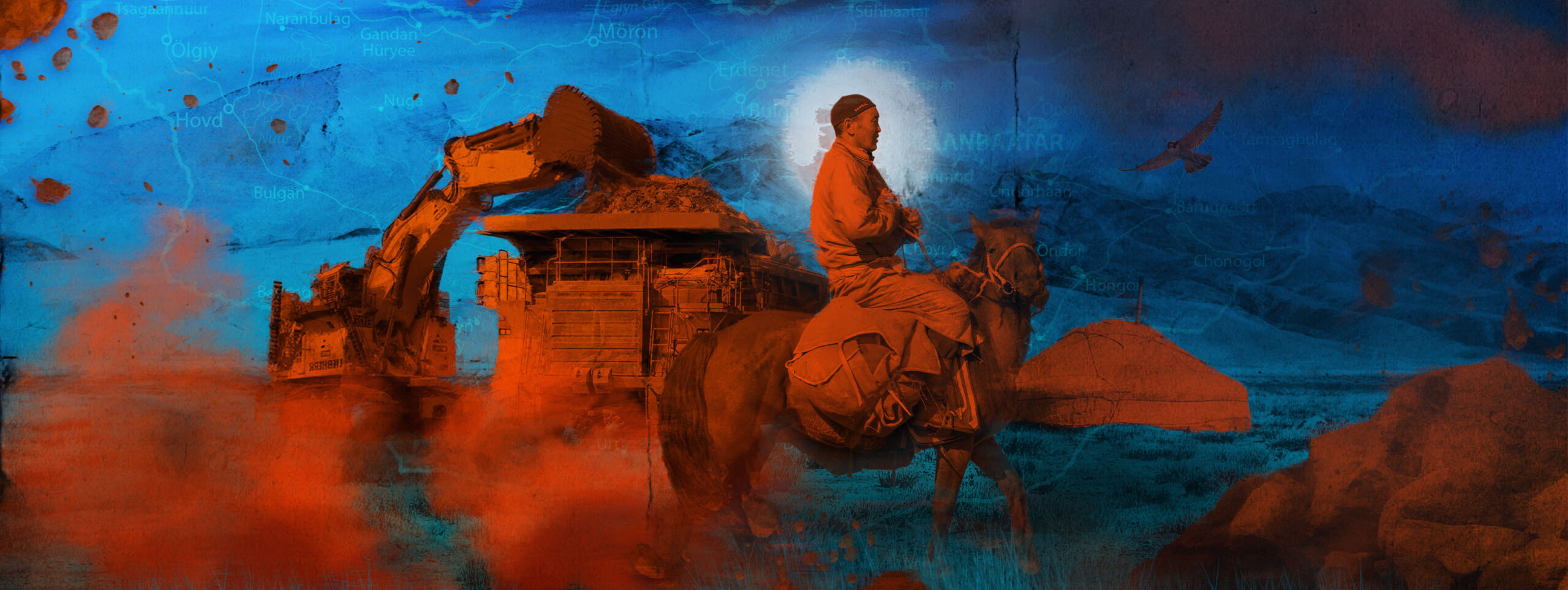|
Getting your Trinity Audio player ready...
|
It’s not clear what had prompted the governor of a soum (subdistrict) in Mongolia’s mineral-rich Dornogovi province to bring over the local state veterinarian to test the animals for possible effects of uranium-mining activities in the area. But what happened to the veterinarian two months after determining that radioactive material was poisoning the animals was swift and direct: the animal doctor was fired.
To observers and Mongolia’s herders alike, the incident underscores the fact that mining companies are not being held accountable for whatever impact their activities are having on communities in the central Asian country. Indeed, due to weak legal safeguards and a mining policy riddled with political conflicts of interest, mining firms are even able to deflect burden of proof regarding increasing health and environment problems on an exhausted and resource-poor locality – and practically ensuring the loss of livelihood for Mongolia’s hundreds of thousands of herders.
Even though Mongolia was the first country in Asia to pass a law protecting rights defenders, some communities that have long been protesting the damage brought by mining companies to their areas remain ignored by local officials.
The most sparsely populated country in the world, Mongolia with its big, open spaces is home to generations of families who have historically had pastoral livelihoods. Around three-fourths of Mongolia consist of pasturelands. Mongolia’s nomadic pastoralists have grazed their flocks of the ‘five snouts’ – horses, cattle (cows and yaks), camels, sheep, and goats – on vast grasslands for centuries, a way of life considered sacred for preserving their landlocked country’s ecosystems. In truth, despite changes brought by urbanization, roughly a third of Mongolia’s 3.35 million people still engage in pastoralism.
But in the last five decades, Mongolia has shifted from an agriculture-based economy to one dependent on mining. Underneath its vast grasslands and desert are an estimated US$1 trillion worth of untapped mineral resources. According to a report by the U.S. Agency for International Development (USAID), about 75 to 85 percent of the country’s land area remains unmapped for potential mineral resources.
It was Mongolia’s transition to democracy in 1990 and its opening to Western capital that pushed the country’s GDP growth. Buoyed by the discovery of major coal deposits and gold-copper ore in the early 2000s, mining’s economic significance has now surpassed that of the country’s traditional livestock sector. Within just two decades, mining’s contribution to Mongolia’s GDP has spiked from a mere tenth to almost a quarter.
But this dependence has not only reshaped the country’s economic landscape; it has also given rise to significant challenges, including environmental degradation, socioeconomic inequality, and the erosion of traditional herding and pastoral practices.
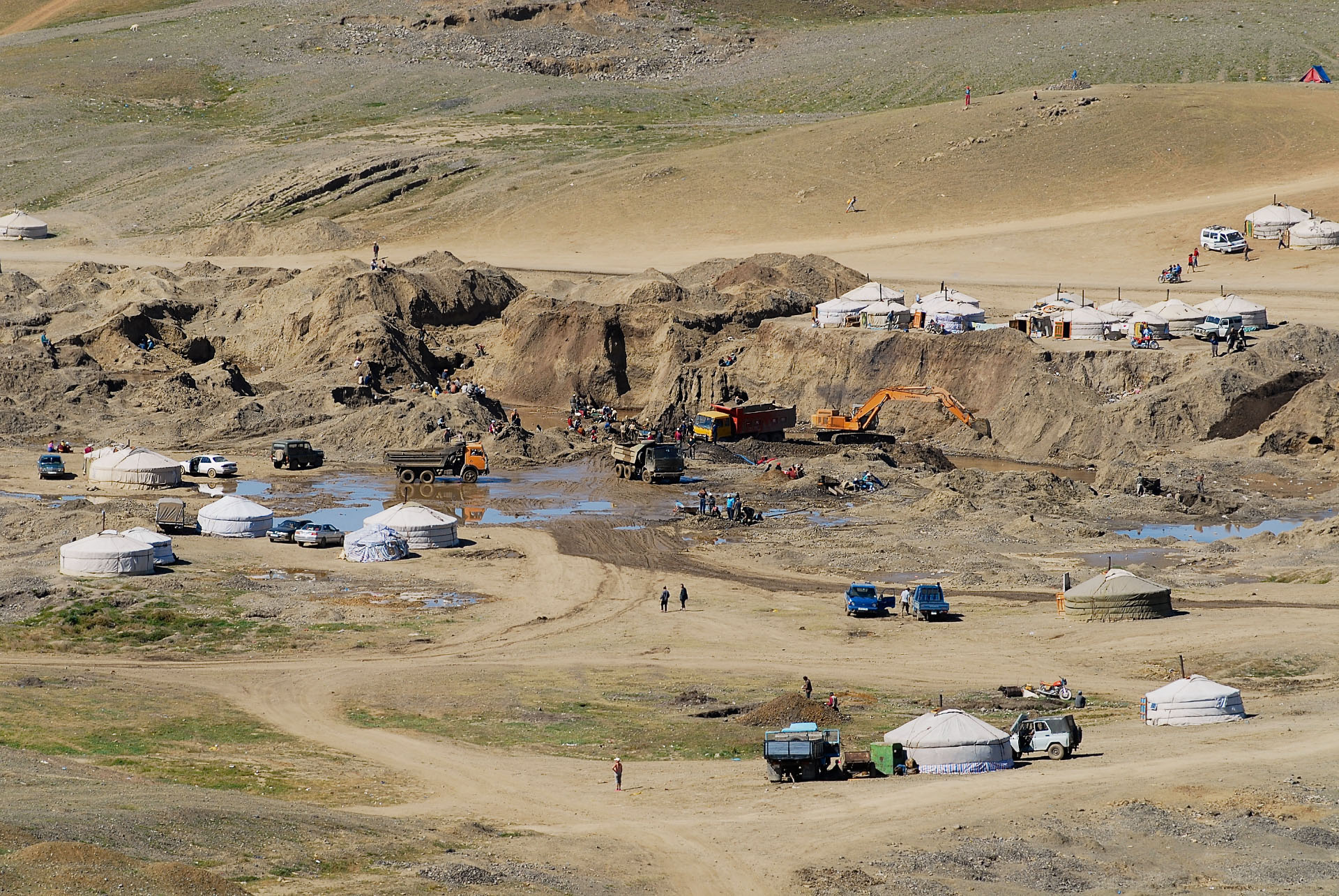
A rich treasure trove
Mongolia primarily mines coal, copper, fluorite, gold, and iron, according to the 2019 U.S. Geological Survey (USGS) Minerals Yearbook. Coal is the most exported among these, with Mongolia having exported 31.8 million tons of it last year, according to the World Mining Congress.
Uranium, however, is poised to be yet another major Mongolian product. Earlier this year, during his visit to the country, French President Emmanuel Macron expressed his support for uranium-mining projects spearheaded by French companies in Mongolia.
According to activists and experts, though, mining has caused serious harm to locals’ lives and livelihoods, including widespread deaths of livestock and the poisoning of drinking water.
Herders have had to deal with poor livestock health as evidenced by the birth of “two-headed, three legged and one-eyed infants, premature deaths and the contamination of animals’ lungs, liver, and heart,” according to an April 2023 report by the Asian Forum for Human Rights and Development (FORUM-ASIA). Moreover, some animals now regularly suffer from foaming mouths and diarrhea.
Aging herders themselves have had to deal with the effects of prolonged exposure to dust from mining operations, with communities living nearby these mining sites suffering from allergies, asthma, and other lung issues.
FORUM-ASIA’s fact-finding team noted that the process of extracting uranium from rocks produces radioactive waste, contaminating sources of drinking water for humans and livestock. A 2017 report by the World Resources Institute also identified the release of lead, arsenic, and other toxic chemicals during gold extraction in Mongolia. These have seeped into groundwater and flowed untreated into rivers.
But communities near mining sites told the FORUM-ASIA team in October 2022 that in almost all instances, they had been unable to prove the direct cause and effect of mining on their lives due to a lack of resources, legal support, and what appears to be collusion between the government and mining firms.
“We do not have the appropriate laboratory test confirming that the uranium is impacting human health too, but we believe it does,” an unnamed herder told the team.
A group of Mongolian citizens has filed a lawsuit against Badrakh Energy, the local subsidiary of the French nuclear-fuel firm Orano SA in Mongolia, claiming that the firm’s uranium-mining activities have caused miscarriages and cancer among the locals, aside from malformations among livestock.
But according to a Euronews report, Orano has insisted that its extraction method is “safe for humans and the environment,” even though the French Sortir du Nucléaire network of associations has indicated otherwise. “The poor quality of the water was recorded in the pilot area long before the first Badrakh Energy operations began,” Orano was quoted as saying.
The French firm said as well that a study that it had commissioned concluded that “the uranium mine project has no negative impact on the environment, human and livestock health.”
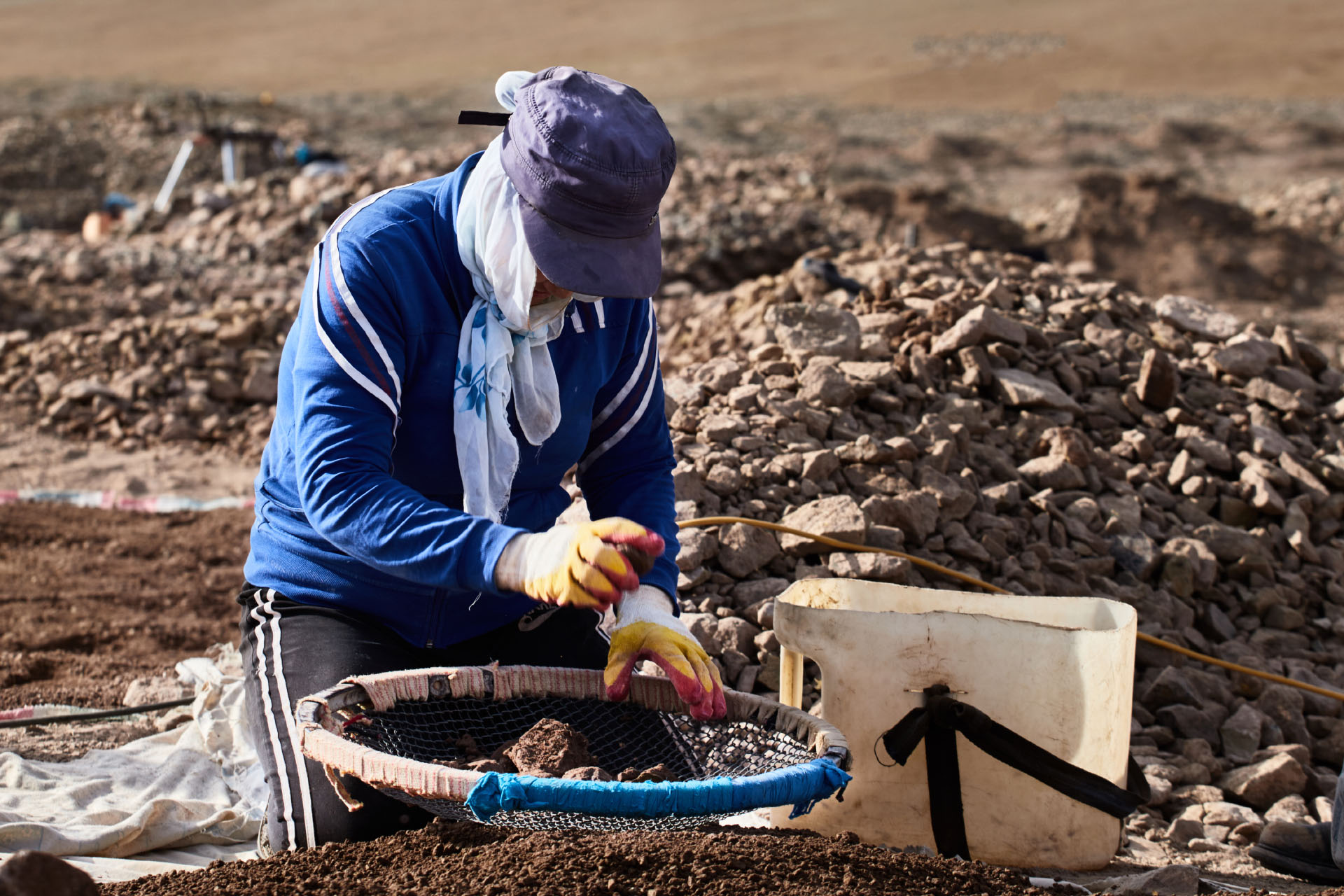
Dismissing evidence
Interestingly, the FORUM-ASIA researchers had observed that mining companies are able to dismiss any proof that their operations adversely affect people’s and animals’ health by simply calling into question the legitimacy and impartiality of the evidence submitted to them, including laboratory results.
“This strategy successfully protects the mining company from any legal action,” said the FORUM-ASIA team.
In one instance, herders and other residents from Ulaanbadrakh (some 644 kms southeast of the Mongolian capital) hired a laboratory to check radioactivity in local wells. While the results revealed there was more than the allowable amount of heavy metals in six wells, the response of the mining company in the area, Badrakh Energy, was “baffling,” the herders told the FORUM-ASIA team.
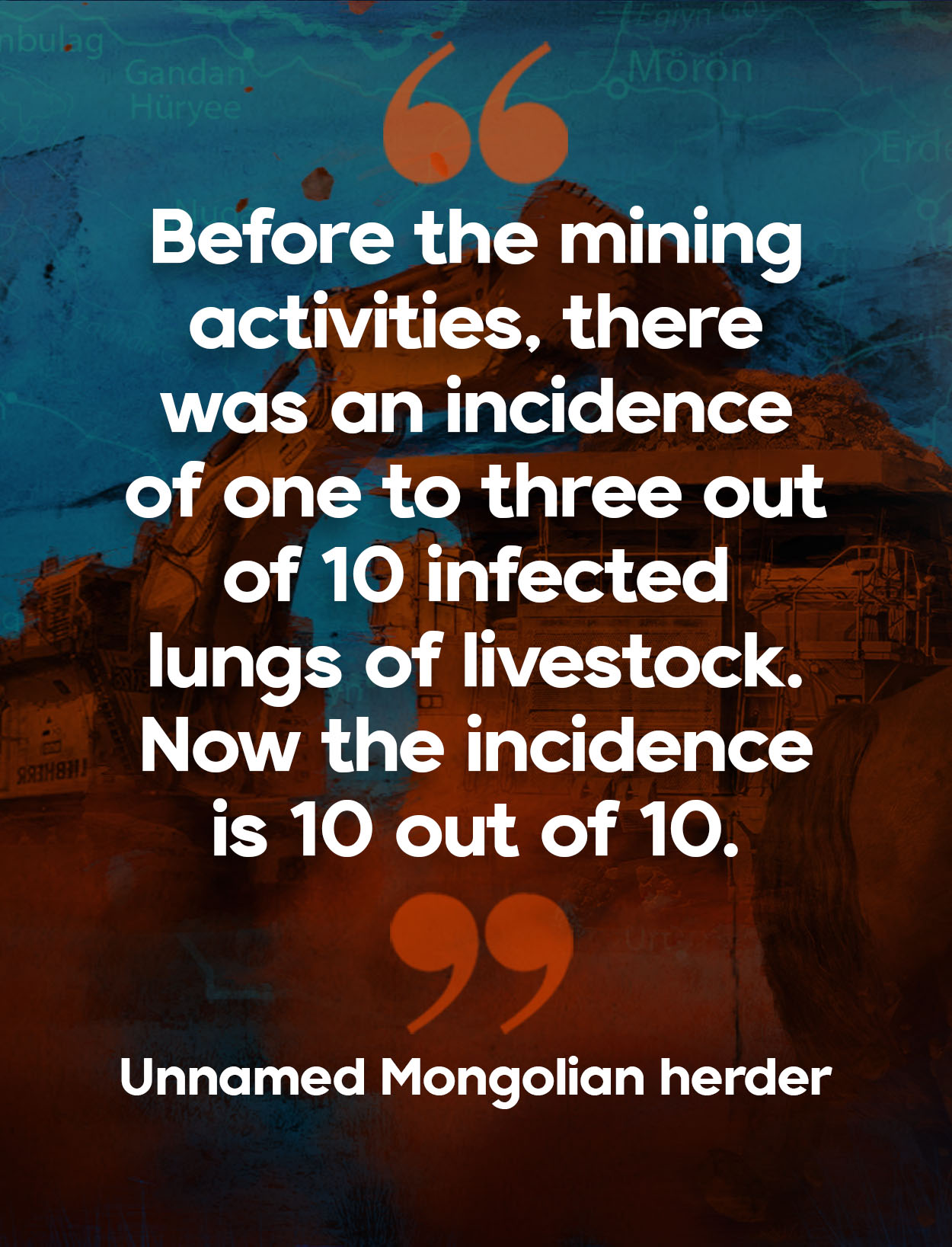
“(Badrakh Energy) said we must have put urine and feces of animals in the well to increase the levels of heavy metals,” a female herder told FORUM-ASIA. “I argued back saying we have been using the same well for centuries, so how did this start only recently?”
Herders in Ulaanbadrakh and Dalanjargalan said that since mining operations began in their areas, they have suffered a loss of income due to the rising number of animals being born with abnormalities and health problems. Buyers now “discriminate” against their meat.
“Before the mining activities, there was an incidence of one to three out of 10 infected lungs of livestock,” a male herder told the fact-finding team. “Now the incidence is 10 out of 10.”
According to one herder community in Ulaanbadrakh, toxic waste from mining sites had led to the death of all infant livestock born in the spring season in 2021. Remarked a herder: “‘If we lose one sheep, we lose MNT 150,000 (US$44). And if we lose one goat, we lose MNT 100,000 (US$29)… We cannot sell or eat our own products. How can we continue to live our lives?”
Yet, the FORUM-ASIA study noted, even as news organizations documented evidence of unhealthy livestock, this did not “meet all the legal requirements to be admissible in court,” making it hard to seek remedies for the community members’ woes.
Local officials are also rarely sympathetic to the plight of herders – at least when they are up against mining firms and apparently if they want to stay employed. For example, when a bag (subdivision of a soum) governor was shown laboratory evidence of radioactive waste affecting animals, he did not flag the mining company suspected of generating the waste. Instead, said the FORUM-ASIA researchers, the official “suggested sending the samples to an independent laboratory in a third country” to avoid “bias.”
Officials of the Provincial Veterinary Authority in Sainshand City — the capital of Dornogovi — meantime maintained that they had received “no verified cases of livestock being impacted by mining activities,” according to the researchers. The government veterinarians even blamed the herders for the fate of their livestock, saying that the limited land where they grazed their animals could be contributing to their poor health.
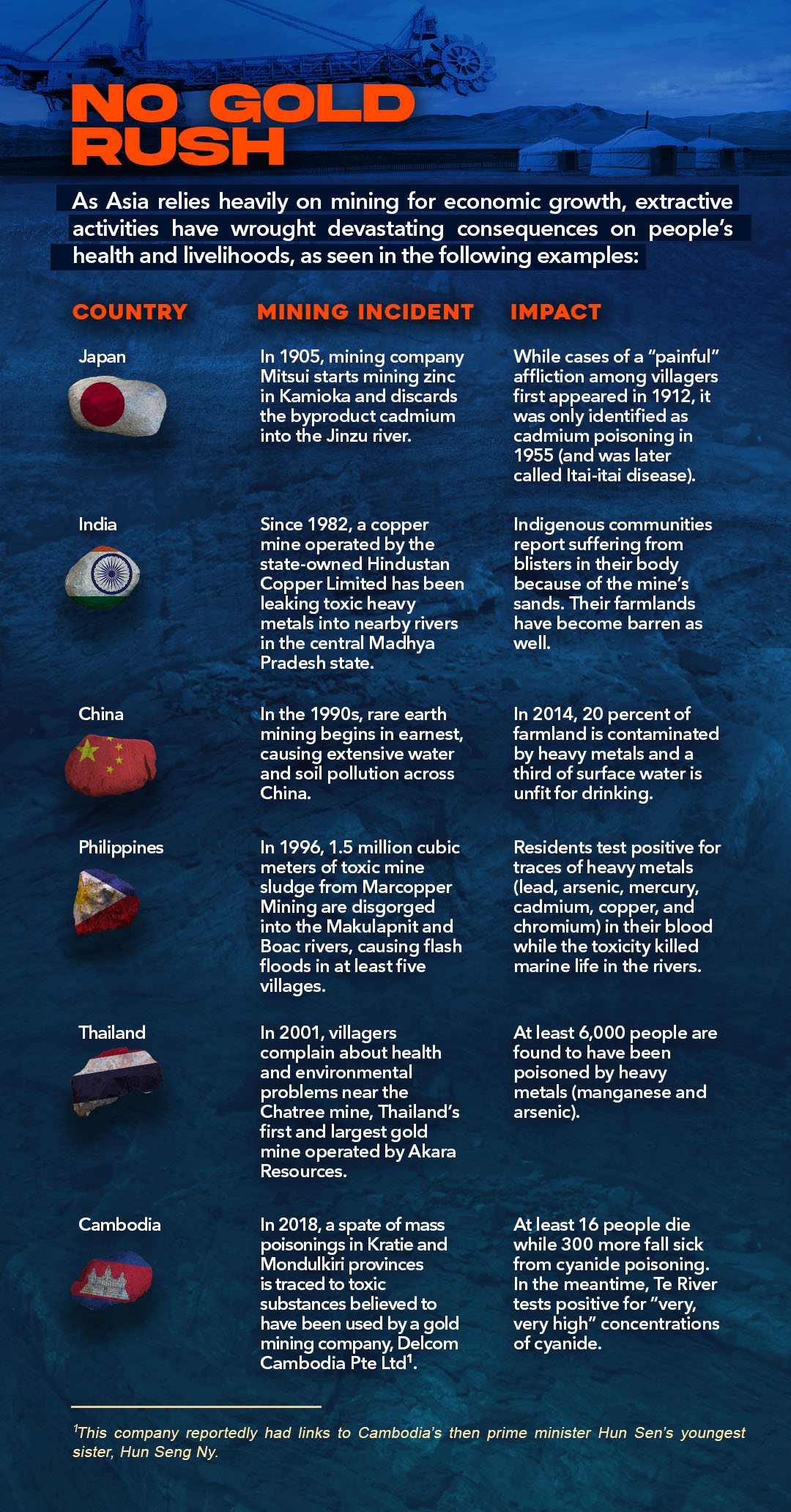
Conflict of state interest
The Mongolian government has long been perceived to be lenient with the mining sector — itself an industry that watchdogs have described as highly vulnerable to corruption.
In one of the country’s worst corruption scandals yet, the state-owned coal company Erdenes-Tavan Tolgoi JSC was revealed last year to have at least 385,000 tons of coal unaccounted for between 2013 and 2019. This prompted widespread protests in Ulaanbaatar that called for an investigation into the “coal thieves” running amok in government.
Most mining firms in Mongolia are either state-owned or joint ventures between international companies and the government, as noted in the 2019 USGS Minerals Yearbook.
In fact, Mongolia’s Minerals Law and the Nuclear Energy Law allows the government to acquire equity stakes that start from 34 percent in certain deposits, while its State Minerals Policy explicitly recognizes the state as a commercial entity, operation participant, and developer in the mining sector.
All these essentially make the Mongolian government both the regulator and a major operator-owner of mining firms – therefore giving little incentive for authorities to tighten regulations on mining operations.
An assessment by Transparency International (TI) Mongolia in 2021 found that the country’s current “Beneficial Ownership Disclosure” laws fail to install strong safeguards and deterrents against corruption and conflicts of interest in mining.
The global corruption watchdog also observed that the public has no access to information on beneficial owners of mining firms. Current laws also limit the definition of beneficial owners to individuals who own 30 percent or more of shares, equity or voting rights, ignoring the reality that a shareholder stands to earn millions of dollars with even less than that.
There is no way as well to screen whether beneficial owners or applicants for mining licenses have political interests, TI Mongolia pointed out.
It’s no wonder then that Mongolia’s prized herders — and the environmental defenders who speak up for them — are at risk of giving up completely. “Money and power have control over everything. Who else should we contact?” herders told the FORUM-ASIA. ◉










